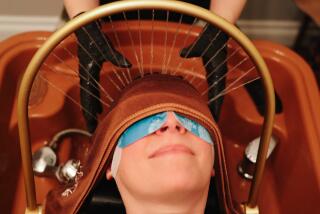BEING THERE : A Clean Pate
My hairline is receding like a fast tide. With such dizzying speed, in fact, that I recently found myself mesmerized by hair replacement ads. It was time, I decided, to see about reforestation.
My first stop was the Elliot & True Medical Group in Beverly Hills, where my transplantation counselor extolled the virtues of the pinpoint dilator. This, I was assured, created much smaller holes than the old punch-graft method. Large holes in the head, I reasoned were something I did not need.
Good as the dilator sounded, I continued my search. At the Bosley Medical Institute in Beverly Hills, I discovered that the hair on the back of my head is genetically programmed to be permanent. It can be moved up top and enjoy a whole new life. Great concept. Just one problem: “It’s a question of supply and demand,” said a Bosley staffer. Alas, in my case demand far outstrips supply. What to do?
Answer: Reduce demand. This, I was informed at the Peterson Medical Institute in Santa Monica, can be achieved by “specialized crown reduction,” a phrase that puts me in mind of Louis XVI and the guillotine. “It’s sort of like a face lift,” I’m told, a simple snip-and-tuck that leaves less scalp to cover with “donor hair” from the back of my head. With visions of my lips playing tag with my eyebrows, I decide to seek other means.
So I looked into a toupee, or more technically, “semi-permanent hair attachment.” This “semi-permanent” stuff scared me. “It’s tape versus adhesive,” said an employee of Silhouette Hairpieces and Wigs in North Hollywood. “It’s a question of whether you want to take your hair off every night.” If yes, I’d use tape. If no, I’d use glue, which would fuse to my existing hair (such as it is) and stay put for five weeks or so until my hair grew out and I’d need to be reglued. I could schedule it regularly, like an oil change.
By then, my quest began to seem slightly bizarre. And I realized that although it may be true that I no longer comb (I buff), it’s also true that I haven’t had a bad hair day in seven years. As one counselor pointed out, “Things could be worse: You could be Lyle Lovett.”






